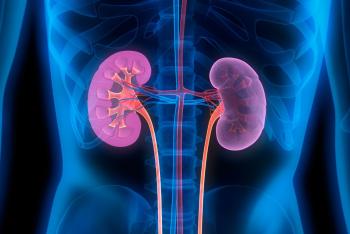The thyroid is a small yet powerful regulator of vital bodily functions. Explore how lifestyle...
Read More
According to the American Thyroid Association, about one in 10 Americans suffer from some type of thyroid disorder. Despite their prevalence, almost half of those thyroid disorders go undiagnosed. Why? While most primary care providers receive some training on glandular disorders, the complexity of these issues can make it difficult for them to be accurately diagnosed. That’s why it’s important to know when to refer patients to an endocrinologist.
“The endocrine system is an intricate loop of circulating hormones and organs that help control metabolism, reproduction, and growth. The thyroid gland, specifically, produces hormones that are essential for overall wellbeing—those that affect brain and heart function, bone development, and regulation of the metabolism,” said Jodi Fox-Mellul, M.D., an endocrinologist at Inspira Medical Group Endocrinology Mullica Hill.
Thyroid-related health issues commonly include hypothyroidism, hyperthyroidism, and thyroid nodules. D “Nodules, while often the most nerve-racking diagnosis for patients to hear, are fairly common,” Dr. Fox-Mellul said. “And while the risk of them being malignant is relatively low, it’s always best for patients to follow up with an endocrine specialist to be fully investigated and treated.”
Unfortunately, many thyroid disorders are either asymptomatic or go undetected by patients. Understanding signs and symptoms of thyroid disease can help early diagnosis and institution of the necessary treatment to halt the progression of possible complications. As a provider, it’s important to pay attention to certain indicators for a thyroid disorder or nodule.
Signs for hyperthyroidism include unintentional weight loss, tremors, heart palpitations and nervousness. On the other hand, symptoms of fatigue and sluggishness can point to hypothyroidism. “Before referring to an endocrinologist, screen for other conditions that may present similarly to a thyroid disorder. And pay attention to the patient’s family and personal health history,” said Inspira endocrinologists.
Nodules are usually asymptomatic and are often found incidentally when other diagnostic tests are being performed, such as a CT scan of the chest. “Primary care providers should always perform neck exams to feel for thyroid nodules,” said Inspira endocrinologist. “If a nodule is suspected, refer to an endocrine specialist for further diagnostic testing. While many nodules are found to be benign, they can impact a patient’s overall health and should be addressed. For example, even a non-cancerous nodule could be associated with hyperthyroidism. In some instances, surgically removing it might benefit a patient suffering from that condition.”
At Inspira Health, we’re fortunate to have providers across all levels of the care spectrum. For complex or difficult to diagnose thyroid issues, our endocrine surgical team is available to work with both you and the referring endocrinologist.
“Diagnostic testing for thyroid issues can be complicated and highly specific, which is why it requires subspecialty training,” said an Inspira endocrine surgeon. “Often, it’s not just a matter of ordering a test. The results must also be properly interpreted, which can sometimes require a team of providers. In addition, regular follow-up appointments are necessary to see how things have progressed. Even if we’re just monitoring a thyroid nodule, an appropriate workup should be given annually for five years.”
Inspira’s endocrinologists work collaboratively with providers to optimize patient chances of positive outcomes. “Our job is to diagnose the issue, educate patients and be there to provide high-quality surgical options when advanced care is required,” said Dr. Kushnir. “We’re here as a resource and aim to establish an open flow of information between us and the primary care providers. Only then can we achieve the best possible results for those we care for.”
To learn more or to refer a patient, call 1-800-INSPIRA.

The thyroid is a small yet powerful regulator of vital bodily functions. Explore how lifestyle...
Read More
The kidneys perform a handful of crucial functions for the body, including maintaining fluid balance...
Read More